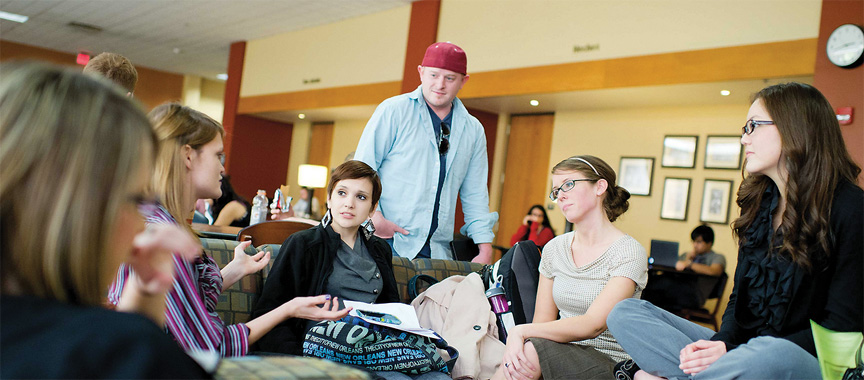
You just lost your job. Or maybe a spouse, or your health or your home. Perhaps you’re the victim of crime, or abuse or the horrors of war. Whatever the underlying cause, you’re hurting and want something to stop the pain.
All too often, that “something” may be drugs or alcohol, raising the specter of trading one pain for another by slipping into addiction.
Standing up in a meeting and admitting addiction or just saying “no” doesn’t always bring recovery. “There has really been much more focus on helping people work through the trauma that has not been resolved,” says Dr. Debra Woody, associate dean of UTA’s School of Social Work. “That’s part of what we do. That’s kind of our cutting edge perspective on substance abuse.”
The School’s vehicle for outreach programs is CARS, the Center for Addiction and Recovery Studies. It began in 1995 under direction of the UT Southwestern Medical Center’s Community Women’s Health Care Division, focusing on pregnant women with substance abuse, at-risk teens and prevention of fetal alcohol syndrome.
The Center was split in 2006, medical services going to Parkland Hospital and prevention programs to UTA, where faculty and students worked on whatever projects they could get funded by government grants. CARS was created in 2011 when, thanks largely to the efforts of Social Work Dean Scott Ryan, a robust research function was added to the community services already in place.
Sherry Bryson coordinates CARS’ outreach programs and the work of the student “interns” who participate in them, working out of a Dallas headquarters. Currently, there are three major initiatives underway – MAVS for Youth, Life Maps and New Connections.
MAVS for Youth goes into schools, mostly in the Grand Prairie ISD, with prevention programs aimed at kids fifth through eighth grade. “We do a 10-week, evidence-based curriculum with them,” Bryson says. “We talk about the truth about alcohol, tobacco and other drugs.” Groups of 10 to 12 students participate in interactive games and role playing intended to teach them consequences of drug abuse and equip them with skills necessary to be able to resist temptation.
Counseling is the focus of Life Maps, which in the past has helped both teenagers and young adults face various crises. Starting in September, thanks to a grant from the Texas Attorney General’s Crime Victim Assistance Program, students are working with “people who have been traumatized through being a victim of crime, be it homicide or human trafficking or whatever,” Bryson says. “We really don’t know what types we’ll get, but we’ll be looking at the underlying trauma and trying to prevent reliance on substances.”
The third program, New Connections, harks back to the organization’s original emphasis on intervention services for women and their children. The three types of services depend on the extent of the drug use and the danger posed to woman and child. One aspect works through referrals from Child Protective Services (CPS).
“In this case the child is already a drug-exposed infant or there’s been some kind of drug or alcohol involvement around the child,” Bryson says. Some women are already addicted and are referred to treatment. Others use drugs recreationally and hopefully can stop when shown the potential harmful affects on their children and family.
“We try to help them look at how their substance abuse has affected their kids,” Bryson says. “We want to show them the whole family dynamic around addiction, how it affects everyone.”
Another part of the program attempts to prevent women from being referred to CPS in the first place. Faculty and interns go into the community to places where many women find out they are pregnant – federally funded clinics, homeless shelters or pregnancy resource centers. “We try to do early intervention with them and give them some education to make sure we pave the way to obstetric care or get them into Medicaid – whatever we can to get them into a healthy pregnancy,” Bryson says. “There are some parts of Dallas with infant mortality rates equal to third-world countries because women aren’t getting pre-natal care.”
These services extend beyond pregnancy to instruction in basic care or early childhood development. “We make it like a mom’s club,” Bryson says.
The third aspect of New Connections takes students past the clinics and homeless centers and into dark heart of the drug world to find clients. “We’ll go to the same places as for our regular outreach,” Bryson says, “but we’ll also go to motels, tattoo parlors and tent cities passing out information, hygiene kits, Granola bars and water. We say, ‘Call us if you find out you’re pregnant.’”
Those who respond may get methadone maintenance so that the baby can be detoxed from heroin. The mothers are guided into pre-natal care and are tracked by the students through pregnancy and delivery.
Tattoo parlors … tent cities … hardly the kind of school field trips most folks remember, but these real-life venues can provide teaching moments for the students, as well as for the clients with whom they work.
“I think, for most of the students, it’s a wakeup call that this is serious business,” Bryson says. “But that’s part of what field placement is all about – to see what social work is all about and practice it, to see where your niche is or maybe where it isn’t.”
The interns, 30 per semester, are both graduate and undergraduate students. Some of the grad students come from an undergraduate social work degree, but others come from various fields of study, such as psychology or sociology. Some enter the program with law or even medical degrees.
The CARS program has operated largely under the radar, existing on grants with virtually no income from individual donations. That changed dramatically in July with the death, after a struggle with addiction and mental illness, of Shey Feherty, son of popular TV golf commentator David Feherty, who lives in the Dallas area and has publicly recounted his own problems with alcohol.
In his obituary the family wrote, “Our Shey is gone from us now, but you can help us keep his light shining and focused if you reach out to another who suffers.” They then requested that memorials be in the form of gifts to CARS.
This was a total surprise to the CARS staff and to Rose Youngblood of UTA’s development office. “I think it was one of the producers on the (Golf Channel) show who reached out to CARS to find out more about it,” she says. “What we think happened is that David searched for a program and found our program here at UTA.”
So far, there have been 25 gifts, and more are expected as the word spreads. Youngblood can’t release any donor names, but says there are names instantly recognizable to golf fans.
But, gifts notwithstanding, the work of CARS will keep seeking out and working with people in need. Not to change them, Bryson emphasizes, but “to help them do some self-exploration … give them more options. It’s going to be up to them, really, whether they want to change, but we want to help them see that hope of change. And to see them go toward that recovery process is a beautiful thing.”
To donate to CARS go online to giving.uta.edu/supportCARS or call Rose Youngblood at (817) 272-6851.















